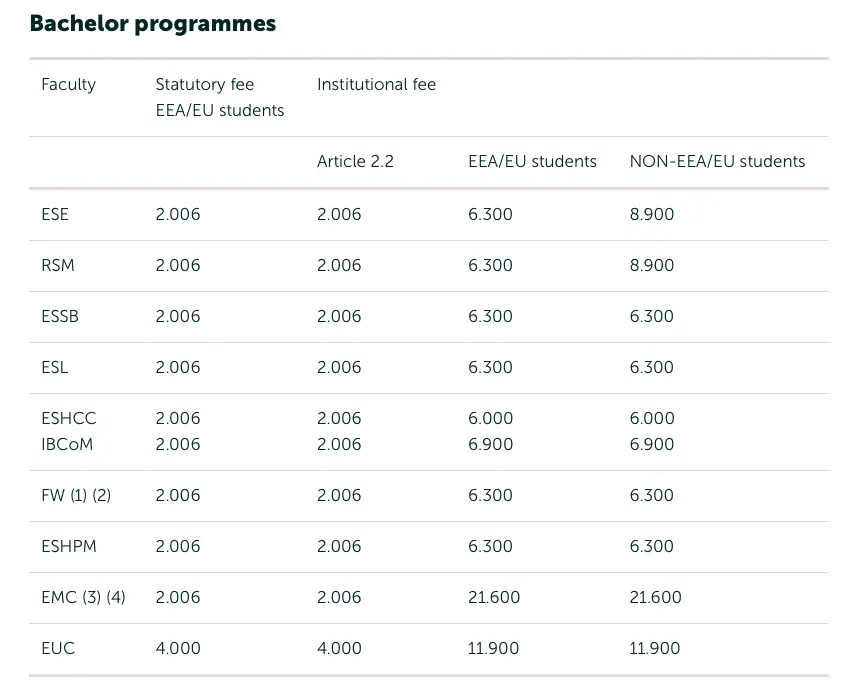One in eight students in the Netherlands is international and this number grows every year. Holland is not only a great touristic destination but also a study destination. If you are planning on studying in the Lower Lands this post will tell you everything you need to know about tuition fees, the Dutch higher education system and how to calculate the cost of your studies.
Every university sets its own rates: EU students have to pay the Statutory Fee. Broadly speaking, this is 2000 euros every academic year for most BA and MA programmes offered by public Dutch universities. NON-EEA/EU students have to pay the Institutional Fee, starting from 6,000 euros.

All these terms and information may sound a bit strange if you are not familiar with the Dutch educational system. Dutch people are quite pragmatic and well-organized, so once you understand how everything works it all makes sense. When it comes to understanding what is the exact amount of money that one has to spend on the tuition fees, it is rather simple: there are two types of tuition fees, statutory fees, and institutional fees. Here we will help you to understand which one corresponds to your situation and you can always calculate it on the website of your university of choice, or ask their International Office.
What are the Statutory Fee and the Institutional Fee?
Statutory fees are the lowest fees that most European students have to pay when enrolling at a public university in the Netherlands. These domestic fees apply for both Bachelor and Master programmes. In order to be eligible for the statutory fee payment, you have to satisfy a certain number of conditions you are allowed to be subsidised by the Dutch Government in order to pay the lowest rate. The Government increases the fees every year in line with inflation, but the variation is very little. In general terms, the two conditions to be eligible for this type of fee are:
- being an EEA/EU student, or in possession of the Swiss or Surinamese nationality (this is independent of where you live or what your incomes are).
- not being in possession of any other Dutch higher education diploma
If you don’t fulfil both of conditions you will have to pay the Institutional Fee, unless specified the opposite.
Institutional fees are the highest fees students have to pay in order to study at a public Dutch university. This means that you don’t meet the requirements for the subsidy of the Government. Therefore, you will be paying the whole university tuition. The price depends completely on the institution and it means that in your case the public Dutch universities work as a private institution.
EXCEPTIONS
To every rule, there is an exception. And there are also several exceptions when it comes to university fees. There are special conditions for a first-year student at a higher education programme, exchange students, technical and medical programmes, part-time students, and a university college student. And here you have them explained:
First-year students

It is the case for most first-year BA students that the tuition fee will be halved. It always depends on the bachelor programme of choice. Therefore, students who are entitled to help from the Government and who have to pay the statutory fee will end up paying 1000 euros. The Delft University of Technologies, for instance, is one of the higher education institutions in this country that offers special prices for first-year students. This always depends on the university and their own requirements. You will have to take them into consideration, but it is worth asking your university of choice to see if this is your case.
Exchange students
If you are doing an exchange programme you will only have to pay your home university tuition fee. Part of the exchange student deal is to be able to study somewhere else breaking boundaries and experiencing new contexts while receiving some financial aid. This applies to ERASMUS exchanges and other privately funded exchanges.
Part-time students
If you are considering studying part-time, you will have a small reduction in your tuition fee. Studying part-time is almost as expensive as full-time. For instance, Utrecht University only discounts 200 euros of the total amount. Of course, it is worth it if you have to combine studying with another activity.
Special programmes
Both Master and Bachelor degrees in the field of Medicine and some Technical sciences tend to be more expensive than those of Arts and Humanities. This is due to the bigger amount of material and infrastructure that you will be using on a daily basis. One thing is for sure, and it is that Dutch Universities are worth every single euro you are paying, in terms of facilities, modern updates, classrooms, studying rooms and everything you may need as a student.
University Colleges
University Colleges don’t fall into the category of public Dutch institutions. Sometimes these are related to the public institution (as it would be the case of Utrecht University and University College Utrecht). This means that you will have some shared lessons or shared facilities. But University Colleges offer private Master and Bachelor programmes. These tend to be a lot more expensive than public ones. Therefore even though you can fulfil all the requirements to be entitled to pay the statutory fee, you will end up paying a similar amount to the institutionary fee. This varies from one programme and university to the other but it is around the 10,000 euros.
What Type of Tuition Fee Do I Have to Pay if I Already Have a Diploma?
A very important exception to take into consideration when enrolling at a Dutch higher education institution is if you already have a diploma. If you are in possession of a Dutch diploma equal to or higher than the programme that you want to follow, you have to pay the Institutional Fee. This law started in 1991, therefore, any diploma obtained after that date falls into it.
This law applies to any of the 13 universities and universities of applied sciences (Hogeschools) and there are a few exceptions: if your field of study is either education or health sciences, the Government considers that you have the right to keep studying even when being in possession of a diploma. In other words, you will be eligible for the statutory fee. The field of health consists of programmes of Medicine, Dentistry, Biomedical Sciences, Health Sciences, Movement Sciences, Health and Life Sciences, among others.
Another exception applies to students who enrol at the same university while still following a programme. Let’s say that you started studying Law and that you have realised that you actually want to study Philosophy. Well, in this case, if you are still doing your first or second bachelor year, you are still entitled to pay for the statutory fee, either if you end up obtaining your Law diploma before you finish our Philosophy degree, or if you don’t. Always within the same institution. The same case applies for MA degrees.
Loans and Grants
Do you have a European passport? Awesome! That means that you can ask for a loan to pay for your degree. Besides several scholarships, getting a grant from the Dutch Government implies that you get a reduction of the fee: instead of paying for the institutional fee, you pay for the statutory fee. But if you still need some help in order to pay for your degree, you can ask for a loan.
You should do this through DUO. This is the institution that takes care of all matters studying related. There are two interesting terms that you want to get familiar with: Studiefinanciering and Collegegeldkrediet.
Studiefinanciering is what you want to ask for. You can either do it online or go to the headquarter offices of DUO and ask for it or for information personally if you have the chance. Apart from that, we have the Collegegeldkrediet, which is the amount of money that you are entitled to receive as your student loan.
This amount equals the tuition fee that you will have to pay. You will receive it in terms, every month for approximately a whole year. It will be up to you to pay your university, so it is worth checking if you can divide your payment into several instalments instead of making it just one.
Extra Tips for University Tuitions
First of all and before even being accepted on any Dutch programme, all universities in this country will ask you to pay an Enrollment Fee: this can be between 50 and 100 euros, so not a whole load of money but something to consider if you apply to more than one university. In this case, this amount won’t be refunded and it won’t be deducted from the total of your tuition fee.
The effect Brexit will have on tuition fees is yet to be discussed. Therefore everything will remind the same for the upcoming enrollment period 2019/2020.